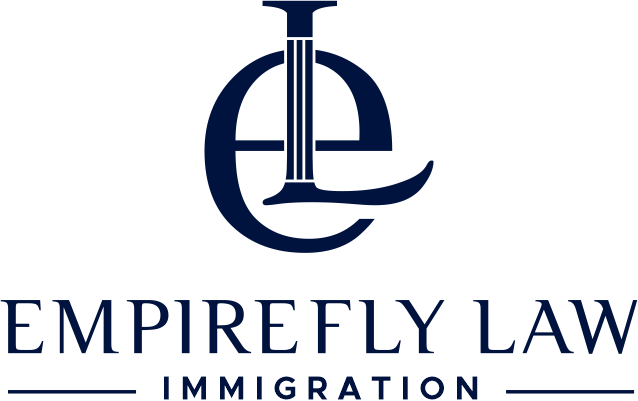K-1 Fiancé Visa
Our Services
K-1 Fiancé Visa for African Immigrants
Bringing African Fiancés to the United States
At Empirefly Law Firm, we are dedicated to helping African clients reunite with their loved ones in the United States through the K-1 Fiancé Visa process. Our experienced attorneys provide comprehensive legal guidance and personalized support to ensure a smooth and successful journey to obtaining a K-1 Visa.
What is a K-1 Fiancé Visa?
The K-1 Fiancé Visa allows a foreign national fiancé of a U.S. citizen to enter the United States for the purpose of getting married. Once in the U.S., the couple must marry within 90 days, after which the foreign national can apply for adjustment of status to become a lawful permanent resident (Green Card holder).
Eligibility Criteria
To be eligible for a K-1 Fiancé Visa, you must meet the following requirements:
U.S. Citizen Petitioner:
- The petitioner must be a U.S. citizen (lawful permanent residents are not eligible to sponsor a fiancé for a K-1 visa).
Intended Marriage:
- Both the petitioner and the beneficiary must have a genuine intention to marry within 90 days of the fiancé’s arrival in the United States.
Meeting in Person:
- The couple must have met in person at least once within the two years before filing the petition (exceptions may apply for certain cultural or hardship reasons).
Legally Free to Marry:
- Both parties must be legally free to marry, meaning any previous marriages must have been legally terminated by divorce, annulment, or death.
K-1 Fiancé Visa Application Process
Petition Filing:
- The U.S. citizen petitioner files Form I-129F, Petition for Alien Fiancé(e), with U.S. Citizenship and Immigration Services (USCIS).
USCIS Review:
- USCIS reviews the petition and, if approved, forwards it to the National Visa Center (NVC) for further processing.
NVC Processing:
- The NVC assigns a case number and forwards the petition to the U.S. embassy or consulate in the fiancé’s home country.
Visa Application:
- The foreign national fiancé completes Form DS-160, Online Nonimmigrant Visa Application, and gathers the required documents.
Medical Examination and Interview:
- The fiancé undergoes a medical examination by an approved physician.
- Attend an interview at the U.S. embassy or consulate, where a consular officer will assess the eligibility for the K-1 Visa.
Visa Issuance:
- If approved, the K-1 Visa is issued, allowing the fiancé to travel to the United States.
Marriage and Adjustment of Status:
- The couple must marry within 90 days of the fiancé’s arrival in the U.S.
- After marriage, the foreign national spouse can apply for adjustment of status to become a lawful permanent resident by filing Form I-485.
Why Choose Empirefly Law Firm?
Expert Legal Guidance:
- Our attorneys have extensive experience in handling K-1 Fiancé Visa cases and provide personalized advice tailored to your unique situation.
Comprehensive Support:
- We offer support at every step of the K-1 Visa process, from petition filing to visa issuance and adjustment of status.
Proven Success:
- Our firm has a strong track record of successfully helping African clients bring their fiancés to the United States.
Client-Centered Approach:
- We are committed to making the K-1 Visa application process as stress-free as possible, offering compassionate and reliable support throughout your journey.
Schedule a Consultation
Ready to start your K-1 Fiancé Visa journey? Take the visa eligibility assessment test. Our experienced attorneys are here to guide you through the process and help you reunite with your loved one in the United States.
GET TO KNOW IF YOU ARE ELIGIBLE for a U.S. Visa
Start Your Visa Eligibility Assessment Today
Find out if you qualify for a U.S. visa with our quick and easy online assessment. Begin your journey today!
FAQS
Answers to Common U.S. Family Immigration Questions
For more personalized guidance and assistance with your family immigration needs, take the Empirefly Eligibility Assessment
You can sponsor your spouse, children, parents, and siblings for a green card. Immediate relatives, such as spouses, unmarried children under 21, and parents of U.S. citizens, have priority and typically face shorter wait times. Extended family members fall under family preference categories and may experience longer processing times due to annual visa caps.
The processing time for a family-based green card varies depending on the relationship between the petitioner and the beneficiary. Immediate relatives can expect processing times ranging from 12 to 18 months. Family preference categories can take several years, depending on visa availability and the applicant's home country.
To sponsor a family member, you must be a U.S. citizen or a lawful permanent resident (green card holder). You must also demonstrate sufficient income to support your family member(s) by submitting an Affidavit of Support (Form I-864). Additionally, the sponsored family member must meet all eligibility requirements, including passing medical and background checks.
Yes, you can sponsor your fiancé(e) for a K-1 visa, which allows them to enter the U.S. to get married within 90 days. After the marriage, they can apply for adjustment of status to become a lawful permanent resident. The K-1 visa process includes submitting a Petition for Alien Fiancé(e) (Form I-129F) and meeting specific eligibility requirements.
If your family member's visa application is denied, it's crucial to understand the reason for the denial, which will be outlined in the decision notice. Depending on the circumstances, you may be able to address the issues and reapply, file an appeal, or submit a motion to reopen or reconsider the case. Consulting with an experienced immigration attorney can help determine the best course of action.
You can check the status of your family member's visa or green card application online through the U.S. Citizenship and Immigration Services (USCIS) website using the receipt number provided when the application was filed. For consular processing, you can check the status on the U.S. Department of State's Consular Electronic Application Center (CEAC) website.
